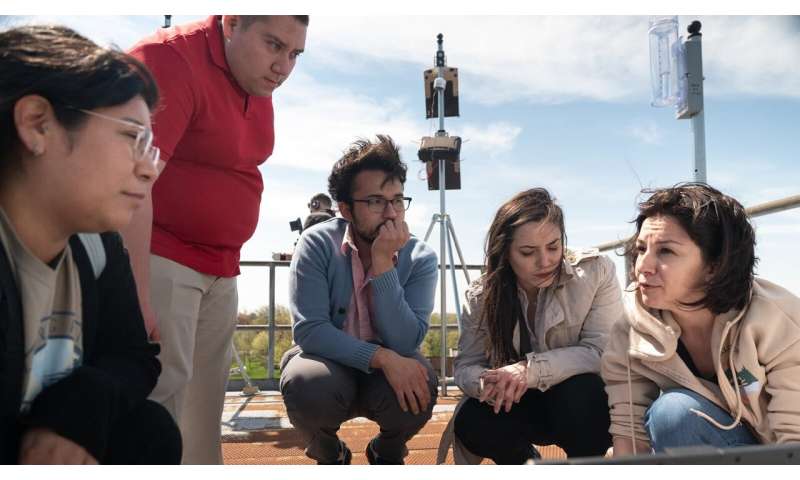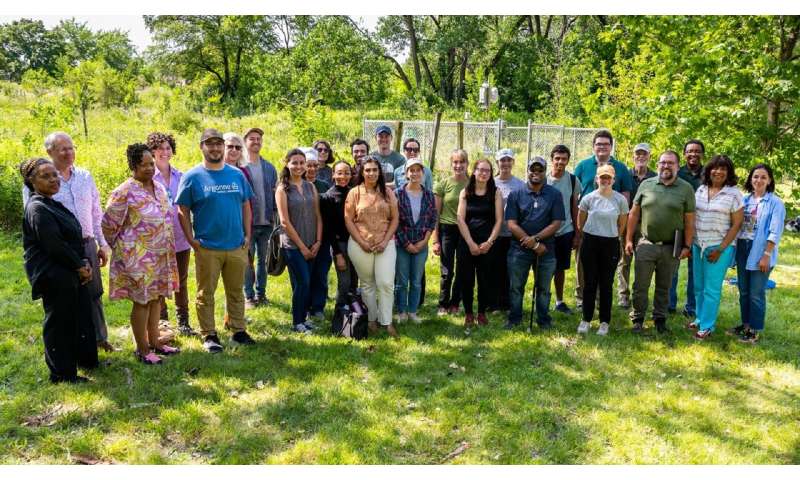Urban climate research project helps shape minority students' science identity

A rooftop in Chicago seems like an unlikely place to start a science career, but on a sunny morning in May, several Northeastern Illinois University (Northeastern) students gathered on the top of a campus building. They were accompanied by scientists from the U.S. Department of Energy's (DOE) Argonne National Laboratory and Northeastern faculty as they installed scientific instruments capable of measuring wind, temperature, rainfall, snow accumulation, radiation and air pollution.
For many of the students, it was their first time participating in anything like this. And on that morning in May, the science identities of a handful of Chicago students began to form.
"People get into STEM professions by increasing their science identity," said Meridith Bruozas, Argonne's institutional partnerships director. "Science identity is where students have positive interactions with scientists and can visualize themselves in a science community. At Argonne, our programs help build student science identities."
Community Research on Climate & Urban Science (CROCUS), a DOE Urban Integrated Field Laboratory led by Argonne, is one of the programs helping shape the science identities of students. CROCUS, which launched in fall of 2022, involves 17 partner organizations from across the Chicago metropolitan area and the country and is funded by DOE's Office of Science, Office of Biological and Environmental Research. Together, the partners are working to advance urban and climate sciences, understand the feedbacks between urban systems and climate, and find solutions to the challenges of the Chicago region's changing climate.
Of those 17 partners, four of the academic partners are minority-serving institutions (MSI) helping educate and train the next generation of scientists to tackle future urban climate challenges. This includes Northeastern, Chicago State University (CSU), City Colleges of Chicago and the University of Illinois-Chicago (UIC).
"A project like CROCUS puts students in a position to work closely with scientists and see themselves as a scientist. It will naturally create pathways for them to enter the science space," Bruozas said.
MSIs are a critical group of CROCUS partners, actively contributing to scientific research, bridging the research to urban communities surrounding their campuses and helping address the underrepresentation of people of color in the scientific workforce.
"As we grow the next-generation workforce, diversity is essential," Bruozas said. "Argonne is a pro-student lab, from the top, all the way down to the mentors. We are strongly supportive of students because we see them as the next generation of STEM leaders, and we know how important it is to have diverse voices in our future leaders."
'CROCUS will help us get a better understanding of climate change firsthand'
The first CROCUS deployment of atmospheric measurement instrumentation occurred at Northeastern in May 2023. The students involved are working with the data streams from the instrumentation and learning how to visualize and infer outcomes from it. They will be gaining important data science skills that are sought after on the job market. They will also use the data in class research projects, especially for Northeastern's new data science minor.
Greg Anderson, the chair of Chemistry, Earth Science, Environmental Science and Physics at Northeastern and CROCUS lead for the university, is most excited about the opportunities CROCUS will bring to his students.
"We have a lot of students who are really interested in science, but they are also interested in making the world a better place," Anderson said. "The kind of research we are doing with CROCUS combines scientific inquiry with issues of social and environmental justice. Being able to combine those two things together provides great opportunities for our students."
One of Anderson's students, Nora Hana, is a junior studying physics. It was her first time engaging with Argonne, and she spent the summer measuring climate and field data.
"I think CROCUS will benefit Northeastern students who are interested in these topics, and it will help us get a better understanding of climate change firsthand," Hana said.

'This summer was all about the instrumentation'
CROCUS's second deployment of monitoring instruments took place at CSU in July 2023. At ground level, instruments will measure waterflows, soil, atmosphere and more. Another sensor on a rooftop measures air quality.
"The deployment was an amazing opportunity for CSU and our community," said CSU CROCUS lead, Tekleab Shibru Gala, a professor of geomatics. "Our students are being introduced to all of these instruments and how to record and maintain data."
CSU students will benefit even more from the new urban climate science curriculum being developed, which would not be possible without CROCUS resources. A more effective curriculum will improve the university's standing, attract international students and help prepare a minority urban climate science workforce.
Gala explained that many students at CSU are not traditional full-time students and have the added challenge of working through school.
"CROCUS is helping support our students financially, allowing them to focus and improve graduation rates," Gala said. "The financial support is one of the things attracting students to our program. Enrollment is up nearly 200% just this past year."
Sophia Vela, a CSU graduate student studying geography while also working full time, got involved with CROCUS and Gala's team. "The summer was all about the instrumentation, working to get the new meters and instruments set up, and learning what each of them do and collect."
CSU's niche programs like geography and geographic information system (GIS) with an environmental focus were something Vela could not find elsewhere. GIS is a system for storing and managing geographic data in the form of maps.
"Bringing CROCUS tools and hands-on science to CSU allows students and faculty to come up with more challenging science research questions," said Vela.
'Everyone gets involved in research that addresses real-world problems'
Next up for instrumentation deployment in the fall of 2023 is UIC. Through professor Miquel Gonzalez-Meler, the CROCUS education and workforce development lead, UIC is involved in all components of CROCUS research and professional development. Specifically, the UIC team is leading biogeochemistry research, studying the health of plants and how they could be healthier to mitigate climate change.
"The most important benefit of the CROCUS partnership to our institution is that everyone gets involved in research that addresses real world problems," Gonzalez-Meler said. Students are collecting environmental data to see how trees around campus are handling urban stressors like drought and heat.
To help recruit students and support them, the university is striving to create inclusive working environments, where everyone is treated with respect and has something to contribute. This includes creating professional development opportunities for existing scientists on how to foster interracial labs. "We are trying to figure out what it means to be a student of color in a lab where no one else looks like them," Gonzalez-Meler said.
With environmental jobs growing fast, institutions like CROCUS partner universities could provide micro accreditations so that adults and students could get job training and improve their job outcomes.
"It is better than a workforce pipeline in that it is more holistic and doesn't require students to get degrees along the way," Gonzalez-Meler said. "It is not all or nothing. They gain something and can go back to their employer and say, 'Hey, I did a bootcamp and can install solar panels.' It is very unique."
One of Gonzalez-Meler's students, Aria Davis, has changed her career plans after spending the summer working with CROCUS. A junior studying biological science, Davis originally intended to go to graduate school and a Ph.D. program to study cell research. But after spending the spring and summer in Gonzalez-Meler's lab studying plants and trees, she wants to focus on environmental DNA.
"Over the summer, we gathered samples from urban and suburban areas around Chicago," said Davis. "Different factors in leaf traits will tell us whether trees are stressed out depending on their environment. In comparison to suburban trees, urban trees are more stressed."
When Davis is out with her family, she can now easily identify trees and notice unhealthy ones. "I had never paid attention to how important plants are. I am a lot more curious," she said. "Being able to spot these things has changed my life and made me grateful to be able to share this information with my family and conduct my own research."
Overall, Davis's experience with CROCUS has been positive, and she thinks it will have a positive impact on communities as well. "Being able to work with a team of people who are genuinely invested in the community and the world around us has been a really great opportunity."
Information about CROCUS internships can be found at crocus-urban.org. Summer internship opportunities are typically posted in the late fall.
Provided by Argonne National Laboratory